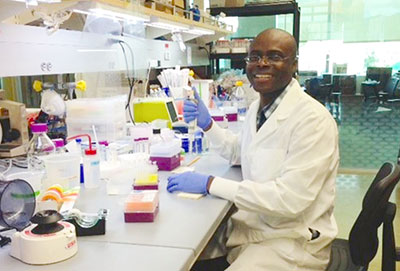
Sepsis, a complication of infection, is one of the leading causes of death in the world. More people die annually of sepsis than of HIV/AIDS, breast cancer or prostate cancer combined. Of the more than one million people diagnosed with sepsis each year in the United States, between 28 percent and 50 percent of them die. It is the tenth leading cause of death among elderly people, and it kills 30 percent of cancer patients.
Sepsis shock can deprive the organs of blood, triggering widespread organ failure and death. There is little medical personnel can do to help these patients. Currently the only treatment for sepsis is merely supportive in nature, including giving fluids and antibiotics.
Felix Ikuomola, a PhD candidate in clinical research at the John A. Burns School of Medicine and a graduate research assistant at the University of Hawaiʻi Cancer Center, has received a $104,477 grant from the National Institutes of Health to fund research he hopes will put natural products from Hawaiʻi’s oceans to work blocking sepsis. He is working in the lab of his mentor, UH Cancer Center Assistant Professor Michelle Matter.
“My work in Dr. Matter’s lab involves screening small molecules, fungi and Hawaiian marine natural products for potential inhibitory function in endothelial cell permeability,” he explains.
An endothelial cell is a thin layer of structural and functional cells that cover the innermost part of blood and lymphatic vessels. Injury or damage to endothelial cells result in breakdown in barrier function, causing widened pores in the vascular lining that allow cancer to spread, as well as sepsis, edema and other vascular life-threatening conditions.
Motivated by deaths close to him
Ikuomola, a U.S. citizen originally from Nigeria, is inspired to save lives because he has seen so many people lose their own struggle with disease, including members of his family.
“While in Africa, I felt frustrated to see my patients—especially the surgical patients with sepsis—without any treatment options. If there had been a pro-endothelial cell barrier enhancing therapeutics, my patient’s lives could have been prolonged,” said Ikuomola.
Ikuomola points out that the same molecular endothelial permeability mechanism also has been implicated in diabetes mellitus and hypertension—the two major leading causes of disease and death in Africans, African-Americans, and Afro-Caribbeans.
“For me, to be involved in vascular biology research is very personal, because when I was seven years old, I lost my beloved father to hypertension-induced hemorrhagic stroke and cousins to diabetic coma. My patients and family have been the driving force for me to be involved in sepsis research,” said Ikuomola.
Why natural marine products?
Ikuomola’s special interest is to understand, at the molecular level, how endothelial cells activate endothelial cell permeability to promote leakiness, and how these cells can also activate different pathways to promote endothelial cell barrier integrity and block leakiness. His work in Matter’s lab involves screening small molecules, Fungi and Hawaiian marine natural products to potentially inhibit function in endothelial cell permeability.
The complex structure and diversity of natural products plays a major role in target-binding selectivity, protein interactions, specificity, and other bio-molecular activities. “We are very hopeful that these Hawaiian marine natural products will work in sepsis because the marine natural products are able to survive the harsh and salty conditions of the ocean and able to control and regulate their internal conditions,” said Ikuomola.
These marine natural products regulate their cells in such a way that they do not suffer from a hyper-permeability condition which could have led to the uncontrollable influx of ocean water or efflux of cellular contents. “So, this property that maintains the cell integrity of the marine natural products is encouraging.”
For the full story go to the John A. Burns School of Medicine’s website.
—By Tina Shelton

